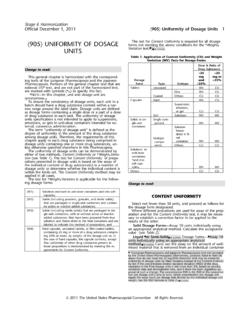Transcription of Online Remote Learning in Higher Education Institutes A ...
1 Higher Education Studies; Vol. 10, No. 3; 20 20 ISSN 1925-4741 E-ISSN 1925-475X Published by Canadian Center of Science and Education 16 Online and Remote Learning in Higher Education Institutes : A Necessity in light of COVID-19 Pandemic Dr. Wahab Ali1 1 Head of Education Department, Fiji Correspondence: Dr. Wahab Ali, Head of Education Department, Fiji. E- mail: Received: April 21, 2020 Accepted: May 12, 2020 Online Published: May 18, 2020 URL: Abstract In light of the rising concerns about the spread of COVID-19 and calls to contain the Corona Virus, a growing number of tertiary institutions have shut down in regards to face-to-face classes globally. The Corona virus has revealed emerging vulnerabilities in Education systems around the world. It is now clear that society needs flexible and resilient Education systems as we face unpredictable futures.
2 A meta-analysis methodology was adopted for this study and pertinent literature was visited to capture the essence of continued Learning during these unprecedented times. Findings reveal that universities worldwide are moving more and more towards Online Learning or E- Learning . Findings also reveal that apart from resources, staff readiness, confidence, student accessibility and motivation play important function in ICT integrated Learning . This exploratory paper proposes that staff members should use technology and technological gadgets to enhance Learning especially during these exceptional times. Findings also propose Online and Remote Learning as a necessity in times of lock downs and social distancing due to COVID-19 pandemic. It also provides a strong platform for further research. Keywords: technology, digital generation, Learning platforms, internet, pedagogy, COVID-19, Online teaching 1.
3 Introduction Against the backdrop of the COVID-19 outbreak various policy initiatives are being launched by governments and tertiary institutions across the world to continue teaching activities so as to contain the virus. However, there is ambiguity and disagreement about what to teach, how to teach, the workload of teachers and students, the teaching environment, and the implications for Education equity (Zhang, Wang, Yang, & Wang, 2020). Large-scale, national efforts to utilize technology in support of Remote Learning , distance Education and Online Learning during the COVID-19 pandemic are emerging and evolving quickly. Literature highlights certain deficiencies such as the weakness of Online teaching infrastructure, the inexperience of teachers, the information gap, the complex environment at home, and so forth (Murgatrotd, 2020). However, despite certain limitations, current situation demands action so that the Education of the students is not affected in any way.
4 For example, China initiated a Suspending Classes Without Stopping Learning policy to see that Learning was not compromised at any time during COVID-19 pandemic lockdown (Zhang et al., 2020). This is one of the many policies China put in place to see that student Learning was least affected during national lockdowns and school closures. To tackle the problems, Huang, Liu, Tlili, Yang, & Wang, (2020) suggest that governments and Education providers need to further promote the construction of the educational information, considering equipping teachers and students with standardized home-based teaching and Learning equipment, conduct Online teacher training and support academic research into Online Education , especially Education to help students with Online Learning difficulties According to a UNESCO Report by the end of 2019, Coronavirus (COVID-19) started rapidly spreading worldwide, causing the death of over 3000 people.
5 Subsequently, several countries started initiating relevant strategies to contain this virus, including school closures. Subsequently, as of 12th March forty six countries in five different continents announced school and university closures to contain the spread of COVID-19 (R. H. Huang et al., 2020). As time moved on 500 million children and youth are still threatened with not attending their schools and universities due to national lock downs. International organizations started paying particular attention to the document Education Response in Crises and Emergencies. UNESCO stated in the Education 2030 Incheon Declaration and Framework for Action that countries should: Provide alternative modes of Learning and Education for children and adolescents who are not in Higher Education Studies Vol. 10, No. 3; 2020 17 Education institutions, and put in place equivalency and bridging programmes, recognized and accredited by the state, to ensure flexible Learning in both formal and non-formal settings, including in emergency situations (R.)
6 H. Huang et al., 2020, p. 1). Subsequently, to contain the COVID-19, the Chinese government has banned most-face-to-face activities, including teaching. The Chinese Ministry of Education has launched an initiative entitled Disrupted Classes, Undisrupted Learning to provide flexible Online Learning to hundreds of millions students from their homes (R. H. Huang et al., 2020). The rapid evolution of Information Communication and Technology (ICT) and the increasing complexity that comes with its exploding potential explains why integration of technology in Education continues to receive special attention particularly, in wake of COVID-19 pandemic. The dawning of the new millennium had witnessed the initial entry of the Net Generation into our Higher Education Institutes , which required staff to brace themselves for a new lineage of learners who had distinctive interests and dispositions.
7 This is because their entry in the world was at a time when technological expansion was ubiquitous and widely adopted throughout the world. A previous research undertaken by the author has revealed that students tend to have a strong bonding with ICT (Ali, 2018). These conspicuous perceptions and the massive lockdown in the midst of current COVID-19 pandemic provided the intrinsic motivation for this study. Aim of the Study Novel coronavirus and the resulting COVID-19 pandemic have resulted in more schools and HE Institutes faced with the challenge of how to maintain continuity of teaching and Learning while facing the threat of extended closures. Subsequently, this study intends to examine how teaching and Learning can still continue during such unprecedented times. Subsequently the study was guided by the following research question: What are some of the challenges and benefits of integrating Online Learning in tertiary institutions in response to COVID-19 pandemic?
8 Significance of the Study The findings of this study are considered to be of great importance to various stakeholders for several reasons. Foremost, there is a paucity of previous research regarding how tertiary institutions are trying to cope with keeping students engaged during COVID-19 pandemic and the closure of many tertiary institutions globally. This study will help uncover critical areas and contribute to local literature on the subject, which in turn could be used by relevant authorities in improving their Education initiatives. Lecturers may realize the importance of undertaking studies in information technology and Online modes as a means of up-skil ling their teaching abilities. The finding of this study will rebound to the benefit of HE institutions by providing them important insights into ICT integrated teaching enabling them to strengthen their programs to better prepare lecturers to deal with the diverse exigencies of the COVID-19 pandemic.
9 Furthermore the study makes considerable contribution through its findings by revealing the difference between various groups and their attitudes towards the integration of ICT in teaching and Learning . Notably, the findings will be of great value to the staff as they are in constant touch with the students and will be able to better understand their behaviour and address Online management issues amicably. In a similar vein, it will also present important information to Education authorities about the benefits of ICT integrated Learning enabling them to include them as pedagogical reforms in Education . In particular, they may have to revisit their curriculum so that ICT knowledge is included in their text at primary and secondary levels. This adaptation would better prepare the students for ICT integrated pedagogy at HE institutions. Subsequently, the recommendations of the study, if implemented, will allow HE Institutes to create an interactive and enjoyable learnin g environment for all students amidst the nationwide lockdown due to COVID-19 pandemic.
10 Learning environments are diverse platforms such as Google Meet, where users engage and interact to learn new skills. While learners can learn in an array of settings, the term refers to the more preferred and accurate alternative to the traditional classroom (Stadler-Altmann, 2015) 2. Methodology An exploratory research design was found to be most appropriate to unveil the salient intricacies associated with Online Learning especially in wake of COVID-19, the worldwide lockdown and social distancing. Exploratory studies are a valuable means of asking questions to establish baseline information that could be later used as a launch pad for further research. Although qualitative research has long been of interest in the field of psychology, meta -analyses of qualitative literatures also known as meta-syntheses is quite common amongst researchers. A qualitative meta-analysis commonly known as meta -synthesis allows for systematic review of qualitative studies Higher Education Studies Vol.













